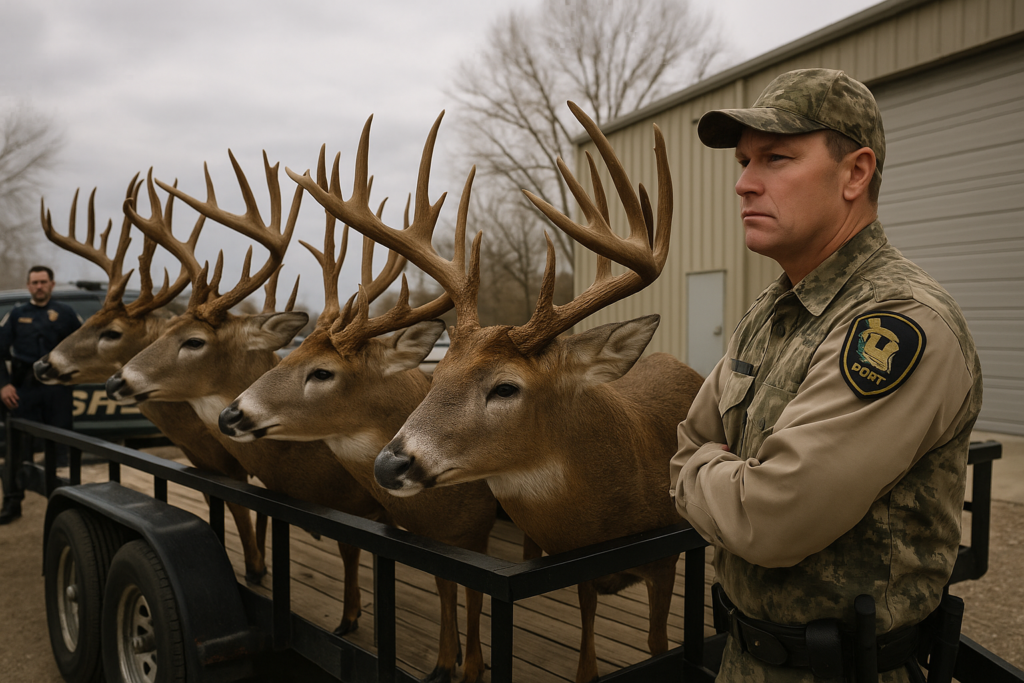Mississippi residents avoided jail time despite killing 60+ deer in organized wildlife trafficking operation

Five Mississippi men have been sentenced in federal court for their roles in a long-running poaching and wildlife trafficking operation that targeted trophy-class whitetails in Southern Illinois over a span of more than two decades.
The case, filed in 2023, has finally been resolved according to a recent Department of Justice press release. Court documents show that between 2018 and 2022, the poachers systematically hunted deer across multiple Illinois counties using illegal spotlighting methods.
The Criminal Operation
According to court records, the group’s method was systematic and deliberate. The poachers would use spotlights to scout white-tailed deer in Massac, Jefferson, Union, Pope and Clark counties in southern Illinois. Once a deer was located, members of the group would get a rifle, spotlight the deer again, and then shoot to kill. They would later return to collect the carcass.
The men then transported the deer across state lines to Mississippi, where they processed and mounted the animals. Federal court documents from September 2023 detail multiple organized trips where the group rented motels and cabins in Illinois specifically for scouting and poaching operations.
Scope Extends Beyond Court Records
While court violations are documented from 2018 onward, Illinois Conservation Police Sergeant Heath Tepovich, who worked the case, revealed the operation had been running much longer.
“Honestly, we really feel we only got maybe a quarter of what they’ve done,” Tepovich said, confirming the men were responsible for poaching approximately 60 deer that officials know about. “We found out that the main guy [Lee Johnson] had been doing it for about 20 years.”
The Defendants and Sentences
All five men received five years of probation but avoided jail time. The total restitution and fees amounted to just under $120,000:
- Lee Jay Johnson, 54, of Saucier, Mississippi (ringleader): $75,000 in restitution fees and $10,000 in fines for Lacey Act violations
- Steven J. Pique, 56, of Biloxi
- Gerald B. Moran, 40, of Saucier
- Joshua A. Marshall, 30
- John M. Pritchard, 57, of Biloxi
The four accomplices split the remaining approximately $35,000 in penalties.
Organized Criminal Enterprise
This wasn’t casual poaching but an organized operation with paid participants. According to Sergeant Tepovich, “[Johnson] was paying people to go get the deer, and he would pay some [locals] to go scout deer as well, prior to him coming up [to Illinois]. It was a conspiracy. They set out to kill trophy deer. That was their big thing.”
Financial Penalties and Wildlife Value
Illinois sets trophy poaching fines based on antler size: 8- to 10-point bucks incur a fine of $1,000 plus $500 per antler point, while bucks with 11 points or more incur $1,000 plus $750 per antler point.
The fines will go to the Lacey Act Reward Account, while restitution fees are turned over to the Illinois Department of Natural Resources.
Federal Response
“This was not an isolated incident of unlawful hunting,” said USFWS Office of Law Enforcement Assistant Director Douglas Ault. “It was a calculated, multi-year operation that exploited Illinois’s prized wildlife resources for personal gain… Such organized violations undermine decades of conservation progress and diminish the integrity of fair-chase hunting traditions that responsible hunters value nationwide.”
Evidence and Enforcement Challenges
Most of the seized taxidermy remains in USFWS custody and will eventually be returned to the Illinois DNR. A few seized deer were returned to defendants as part of legal agreements.
Sergeant Tepovich emphasized the difficulty of catching such operations: “It’s hard to catch these people and when you do, you’ve got to set an example. And I think we did that. I’m glad we’ve stopped them.”
However, he expressed concern about recidivism: “It’s been my experience that [once convicted] people like that stop for a little bit. But then, they also cannot stop.”
Public Awareness Campaign
Tepovich stressed the importance of public vigilance in combating poaching: “The biggest misconception of poaching is that people are doing it for food. And, you know, most of the time they’re just out for the trophy and the kill.”
Poaching violations are notoriously difficult to document and prove, making public reporting of suspicious activities crucial for law enforcement efforts.
Conservation Impact
The case highlights the broader impact of organized poaching on wildlife conservation efforts. The systematic removal of trophy-class bucks affects genetic diversity and population management strategies that wildlife biologists spend years developing.
The operation’s 20-year timeline suggests hundreds of deer may have been illegally killed, though only 60+ can be confirmed through court proceedings.
This case represents one of the larger organized poaching operations prosecuted in recent years, demonstrating both the challenges conservation officers face and the need for continued vigilance in protecting wildlife resources.
